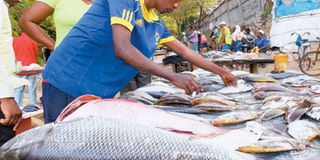Non-landlocked countries advised on blue economy

What you need to know:
- If properly utilised such countries can generate more revenue to be spent on improving service delivery and eventually tackling poverty, South Sudan Livestock and Fisheries minister James Duku said.
Dakhla, Morocco. Most non-land locked developing countries are yet to exploit their huge potential in the blue economy, a South Sudan minister says.
If properly utilised such countries can generate more revenue to be spent on improving service delivery and eventually tackling poverty, South Sudan Livestock and Fisheries minister James Duku said.
“The most obvious asset in the world’s blue economy is our fish stocks as they play a critical role in many economies as a source of nutrition, food and livelihoods mostly for the vulnerable and poorest in the world.”
He was speaking in a panel on the ocean economy and fishing industry in Africa in Dakhla, a city in Western Sahara, a disputed territory currently administered by Morocco, during the Crans Montana Forum on Africa and South-South Cooperation.
He also spoke about the importance of fighting illegal fishing.
He urged developing countries to invest heavily in blue economy. According to him, marine-based industries contribute $4 trillion to the global economy, with plenty of opportunity for growth.
But the challenge is how to have a sustainable growth and equitable management.
The forum brought together more than 1,000 participants from over 100 countries.
A Moroccan expert on fisheries and marine economy, Mr Marick Faraj, underscored the importance of enhancing the contribution of fisheries in economies of non-landlocked developing countries.




